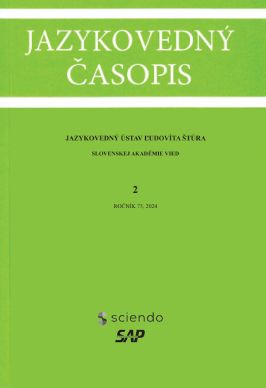Slovene dialectal hapax legomenon mežek ‘young bear’ and Slavic *mečьkъ ‘bear’
DOI:
https://doi.org/10.2478/jazcas-2024-0035Keywords:
hypercorrection, voice, linguistic change, Slovene, Slavic, etymology, words for ‘bear’Abstract
In the paper, the Slovenian dialect hapax legomenon məžək ‘young bear’, which was only attested in a narrow area of the Gorenjsko dialect, is related and explained from South-Slavic *mečьkъ ‘bear’ (= Serbian dial. méːčak, Macedonian dial. mečòk). The regularly expected phonetic development from *mečьkъ would be reflected as Slovenian *mečək, therefore, the Gorenjsko məžək belongs to those lexemes which have undergone non-systematic and sporadic phonetic changes. In the paper, it was not possible to give an unequivocal answer to the question of the etymology of the word family *mečьkъ : *mèčьka : *mečьcь with the starting point in the noun *mèka f ‘bear’, because *mèka could be a hypocoristic for *meduedь ‘bear’ or a deverbative from *me-ka-ti of onomatopoeic origin.
Downloads
Published
How to Cite
Issue
Section
License
Copyright (c) 2025 Metka Furlan

This work is licensed under a Creative Commons Attribution-NonCommercial-NoDerivatives 4.0 International License.


